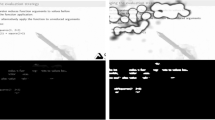Abstract
We present a user study to investigate which factors affect student attention to user-adaptive hints during interaction with an educational computer game. The game is Prime Climb, an educational game designed to provide individualized support for learning number factorization skills in the form of hints based on a model of student learning. We use eye-tracking data to capture user attention patterns on the game adaptive-hints, and present results on how these patterns are impacted by factors related to existing user knowledge, hint timing, and attitude toward getting help in general. We plan to leverage these results in the future for making hint delivery adaptive to these factors.
Access this chapter
Tax calculation will be finalised at checkout
Purchases are for personal use only
Preview
Unable to display preview. Download preview PDF.
Similar content being viewed by others
References
de Castell, S., Jenson, J.: Digital Games for Education: When Meanings Play. Intermedialities 9, 45–54 (2007)
Van Eck, R.: Building Artificially Intelligent Learning Games. In: Gibson, D., Aldrich, C., Prensky, M. (eds.) Games and Simulations in Online Learning: Research and Development Frameworks, pp. 271–307. Information Science Pub. (2007)
Conati, C., Manske, M.: Evaluating Adaptive Feedback in an Educational Computer Game. In: Ruttkay, Z., Kipp, M., Nijholt, A., Vilhjálmsson, H.H. (eds.) IVA 2009. LNCS, vol. 5773, pp. 146–158. Springer, Heidelberg (2009)
Peirce, N., Conlan, O., Wade, V.: Adaptive Educational Games: Providing Non-invasive Personalised Learning Experiences. In: Second IEEE International Conference on Digital Games and Intelligent Toys Based Education (DIGITEL 2008), Banff, Canada, pp. 28–35 (2008)
Johnson, W.L.: Serious use for a serious game on language learning. In: Proc. of the 13th Int. Conf. on Artificial Intelligence in Education, Los Angeles, USA (2007)
Conati, C., Merten, C.: Eye-tracking for user modeling in exploratory learning environments: An empirical evaluation. Knowl.-Based Syst. 20(6), 557–574 (2007)
Baker, R., Corbett, A., Roll, I., Koedinger, K.: Developing a generalizable detector of when students game the system. User Model. User-Adapt. Interact. 18(3) (2008)
Aleven, V., McLaren, B.M., Roll, I., Koedinger, K.R.: Toward Tutoring Help Seeking. In: Lester, J.C., Vicari, R.M., Paraguaçu, F. (eds.) ITS 2004. LNCS, vol. 3220, pp. 227–239. Springer, Heidelberg (2004)
Roll, I., Aleven, V., McLaren, B.M., Ryu, E., Baker, R.S.J.d., Koedinger, K.R.: The Help Tutor: Does Metacognitive Feedback Improve Students’ Help-Seeking Actions, Skills and Learning? In: Ikeda, M., Ashley, K.D., Chan, T.-W. (eds.) ITS 2006. LNCS, vol. 4053, pp. 360–369. Springer, Heidelberg (2006)
Bee, N., Wagner, J., André, E., Charles, F., Pizzi, D., Cavazza, M.: Interacting with a Gaze-Aware Virtual Character. In: Workshop on Eye Gaze in Intelligent Human Machine Interaction, IUI 2010 (2010)
Prasov, Z., Chai, J.: What’s in a gaze? the role of eye-gaze in reference resolution in multimodal conversational interfaces. In: IUI 2008 (2008)
Muldner, K., Christopherson, R., Atkinson, R., Burleson, W.: Investigating the Utility of Eye-Tracking Information on Affect and Reasoning for User Modeling. In: Houben, G.-J., McCalla, G., Pianesi, F., Zancanaro, M. (eds.) UMAP 2009. LNCS, vol. 5535, pp. 138–149. Springer, Heidelberg (2009)
Muir, M., Conati, C.: Understanding Student Attention to Adaptive Hints with Eye-Tracking. In: Ardissono, L., Kuflik, T. (eds.) UMAP 2011 Workshops. LNCS, vol. 7138, pp. 148–160. Springer, Heidelberg (2012)
Woolf, B.P.: Building intelligent interactive tutors: Student-Centered strategies for revolutionizing elearning. Morgan Kaufmann (2008)
Easterday, M., Aleven, V., Scheines, R., Carver, S.: Using Tutors to Improve Educational Games. In: Biswas, G., Bull, S., Kay, J., Mitrovic, A. (eds.) AIED 2011. LNCS, vol. 6738, pp. 63–71. Springer, Heidelberg (2011)
Linehan, C., Kirman, B., Lawson, S., Chan, G.: Practical, Appropriate, Empirically-Validated Guidelines for Designing Educational Games. In: CHI 2011, pp. 1979–1988 (2011)
Just, M., Carpenter, P.: The Psychology of Reading and Language Comprehension, Boston (1986)
Author information
Authors and Affiliations
Editor information
Editors and Affiliations
Rights and permissions
Copyright information
© 2012 Springer-Verlag Berlin Heidelberg
About this paper
Cite this paper
Muir, M., Conati, C. (2012). An Analysis of Attention to Student – Adaptive Hints in an Educational Game. In: Cerri, S.A., Clancey, W.J., Papadourakis, G., Panourgia, K. (eds) Intelligent Tutoring Systems. ITS 2012. Lecture Notes in Computer Science, vol 7315. Springer, Berlin, Heidelberg. https://doi.org/10.1007/978-3-642-30950-2_15
Download citation
DOI: https://doi.org/10.1007/978-3-642-30950-2_15
Publisher Name: Springer, Berlin, Heidelberg
Print ISBN: 978-3-642-30949-6
Online ISBN: 978-3-642-30950-2
eBook Packages: Computer ScienceComputer Science (R0)




